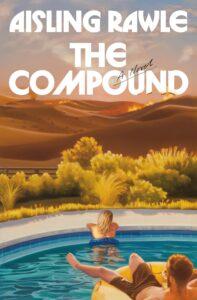
Our basket of brilliant reviews this week includes Brian Dillon on Geoff Dyer’s Homework, Heather Scott Partington on Joyce Carol Oates’ Fox, Leah Greenblatt on Karim Dimechkie’s The Uproar, Jillian Steinhauer on Allison Bechdel’s Spent, and MJ Franklin on Aisling Rawle’s The Compound.
“‘It needs to be emphasized: I did not grow up in poverty.’ I recognize the need: all the while I was reading Homework—Geoff Dyer’s rich, comic, moving, but slightly reticent new memoir—I was troubled by chronology and class. Dyer, who was born in 1958 and grew up in Cheltenham, England, is eleven years my senior. Does his 1960s childhood resemble mine in the 1970s because my native Dublin lagged behind the times, trailing even a middling English town? Or is it because, for most people in these islands, once postwar austerity had passed, the still-straitened era Dyer describes actually lasted from the mid-1950s to some point in the 1980s? Dyer evokes it all beautifully: a world of basic comforts and meager ambitions, deference and gratitude for what one had, also a keen sense that luxury and liberty were elsewhere. The most plausible line of flight from this life lay in formal education.
As a first adventure in straight autobiography from a very autobiographical writer, Homework is not yet the story of how Geoff Dyer, the boy of modest means and milieu, became the curious, ironic, lavishly amusing writer of essays and fiction, smart and boisterous studies of jazz, D. H. Lawrence, photography, tennis, Andrei Tarkovsky’s Stalker, and much more. There is surely a second volume to be written about student days at Oxford, proto–literary life on the dole in 1980s London, the influence on Dyer of his friend John Berger. For now, the pre-prehistory: a book as much about the author’s class-constrained parents as about the son who would inevitably leave their timid outlook behind—thanks largely to educational opportunities provided by the postwar welfare state.
…
“As ever with Dyer, in Homework he shows an enviable knack for turning humdrum or low-key shameful details of his life into jokes that are metaphysical in both the philosopher’s and the poet’s senses. Abject details blossom into bold metaphors, flourishing but undercut in the same winking moment.
…
“An oddity of Homework, however: Dyer was a teenager during glam, punk, gay liberation, mainstream visibility of second-wave feminism, the rise of the National Front and racist politicians like Enoch Powell. But aside from an enthusiasm for sci-fi and prog rock, he seems blithely untouched by larger or more urgent cultural moments or movements. Could it be, with his literary awakening via Shakespeare, and his promising school grades, that the future ironist was somewhat conventional? It would be a good subject to commence any sequel to Homework.”
–Brian Dillon on Geoff Dyer’s Homework (4Columns)
“Fox has the bones of a potboiler but is supported by the sinew of the author’s elegant structure and syntax. She draws on natural imagery and a haunting sense of the macabre, castigating the reader‘s too-easy assumptions. The book incorporates a delightfully complicated, interwoven cast of characters in small-town New Jersey; elements of class, gentrification and divided families create opportunity for misunderstanding and misdirection.
The novel is a whodunit, but to reduce it entirely to that distinction would be inaccurate. Like Humbert Humbert in Nabokov’s Lolita, which Oates’ protagonist references and dismisses frequently, Fox’s story is inescapably abhorrent yet enthralling. As Nabokov wrote of his own novel, it lacks a moral, and a moral center.
…
“Oates seems to posit that we allow whatever entertains, and we return to whatever has entertained before. She picks at the American lionization of our creative heroes, especially those with asterisks next to their names because they’ve abused young women. That society allows such men to become heroes is as troubling as her protagonist’s actions. It appears that she wants us to indict us, too.
…
“The allusive nature of Fox and its twist ending shows how greatness that comes from awfulness can be inconveniently, unquestioningly good. What do we do with the idea that the worst offenses can also sometimes create art? Readers, consumers and audiences haven’t yet come to peace with that, just like we haven’t come to terms with how to separate art from a monstrous artist. Oates wants us to turn pages and squirm.”
–Heather Scott Partington on Joyce Carol Oates’ Fox (The Los Angeles Times)
“Hand wringers and nervous Nellies, heed what the title and cover of Karim Dimechkie’s The Uproar are telling you: incident, outrage, very big dog. This is storytelling as anxiety dream, a bruising conflagration where best-laid plans meet worst-case scenarios again and again. Thankfully, it’s also a great, galloping read, pointed and provocative; the kind of book you might call a good bad time.
…
“Dimechkie, a nimble social satirist and crack observer of the masks that people wear, is cutting but not unkind to his polyglot cast of characters. When not whipsawed by jealousy or anxiety, Sharif is a smart and sympathetic guy, though he can also be maddeningly naïve—an incurable idealist who continues to insist that logic, cool heads and some kind of cosmic karmic justice will prevail, long after several red flags have been dipped in kerosene and set on fire.
Considering the convergence of current cultural bugaboos on deck here—race, class, cancel culture, immigration—The Uproar mostly wears its topicality lightly, preferring the granular pull of human drama to editorial hectoring or lectures. What it does interrogate over and over again, in perspectives that shift and bend, is the inherent idea of goodness.”
–Leah Greenblatt on Karim Dimechkie’s The Uproar (The New York Times Book Review)
“The flow of all this can occasionally become unwieldy, and at times it’s hard to locate the book’s center of gravity. But the reader never gets truly lost: Bechdel weaves the plot strands together in an entirely navigable way—a skill she learned from decades of writing and drawing Dykes. And if the narrative is laden with details (and Easter eggs), that’s at least partly by design: Spent is very much about the overwhelmingness of today’s world.
…
“In many ways, Spent is as much about pleasure as it is about chaos, whether that’s the pleasures of the flesh or the simpler delights of curling up with a cat or sitting by a fire under the stars. The feeling also comes through in the book’s full-color palette, which is rich with reds, purples, blues, and greens. Bechdel has been very slow to embrace color: Fun Home was washed solely with a melancholy blue, Are You My Mother? with an archival red. Superhuman Strength marked the first time that she brought more hues into her work, via a labor-intensive collaboration with Holly Rae Taylor. Yet even then, they remained light and largely pastel—more evocative accent than driving force. In Spent, the colors are stronger and more prominent; Taylor’s work feels like it’s become an engine of the story, just as Holly the character is, too. It contributes to the sense that Bechdel’s scope of inquiry has expanded, and that the book is alive and alert to the present day.
…
“What’s notable, too, is that Bechdel is clearly putting into practice what she’s preaching. Spent sees her trying to move out from the long shadow of memoir—modeling the idea of pushing forward and not getting stuck in the past. The book is still about her, but not wholly; it’s also a story told, lovingly, at her own expense. Decades of introspection have ultimately led her to look out.
Thankfully, she hasn’t fully jettisoned her trademark earnestness or passion—every Bechdel project is an attempt to answer a Big Question—but she has found a way to treat those qualities with a lighter touch. Spent is an attempt to merge the early lessons of writing and drawing Dykes with those learned from the more mainstream books that followed. It’s a gambit for how to be in relation to a daunting world. In the end, Bechdel insists that there’s value in trying to shape something meaningful from the chaos—just as long as it’s not reality TV.”
–Jillian Steinhauer on Allison Bechdel’s Spent (The Nation)

“The premise itself is the novel’s first achievement—the TV show is a wonderfully abhorrent and ethically dubious monstrosity, and a testament to Rawle’s imagination … They come together to form a fantastically and uncomfortably fun drama, one that is particularly enjoyable because of a profane truth: It’s entertaining to watch hot people do psychotic things. Characters scheme and hoard resources; at one point a player half-drowns another so the group can get a couch. Romances bloom and are betrayed. The unseen producers give increasingly deranged orders like ‘Task: Spit in your bedmate’s mouth. Reward: Sun loungers.’
…
“With such a juicy conceit, it would be easy to view the novel as just an easy summer romp. But Rawle is up to something more thoughtful; The Compound joins a budding genre of fiction that uses disturbing televised competitions to critique our social norms, including Chain-Gang All-Stars and The Hunger Games.
Where those books flash between competitors and their spectators to expose the brutality we’re willing to consume as entertainment—as well as the prison industrial complex, oppression, tyranny, fascism—The Compound takes a different approach: keeping us firmly ensconced in the story’s shambolic Eden. We get only glancing references to what lies beyond—contestants are prohibited from sharing details of their lives outside the show—and they all hint at some type of devastation: ‘I wondered if any of the boys had fought in the wars,’ Lily cryptically muses. Looking out into the desert beyond the property, she thinks she sees red plants growing. A contestant quickly corrects her: ‘Those are bush fires.’ But is the paradise inside the compound any safer? Having arrived on this show to escape boredom and suffering in the outside world, what are the contestants willing to sacrifice for an illusion? With The Compound, Rawle has made working through these heavy questions both thrilling and haunting.”
–MJ Franklin on Aisling Rawle’s The Compound (The New York Times Book Review)

